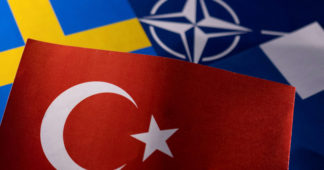by Oksana Chelysheva
50 years ago Finland welcomed the first political refugees to the country. Those were Chileans fleeing the military coup of 1973. On September 11th Finland marked this anniversary with the ceremony held at the Helsinki City Hall.
One would be mistaken to think that the events were limited to this particular date. A number of events were held with the participation of ambassadors, politicians and people of art has extended over one week period.
The ceremony at the Helsinki City Hall brought together more than 200 people, including ambassadors of Chile, Spain and a number of Latin American states.
The number of the seats in the Helsinki city hall happened to be a reflection of the actual number of Chilean refugees who were rescued by Finland since 1973.
Still, that first group of 182 Chilean refugees has had tremendous impact upon the history of the relations between the two countries. Its impact is that strong that one person in Helsinki told me this morning that “there are very many Chileans in Finland”.
Belen Sapag Munoz de la Pena, the ambassador of Chile to Finland, stated in her address, ”Those Chileans who came first to Finland have helped to a lot to strengthen the biletaral ties between our countries”.
The event in the City Hall was also a launch of the two-language book ”Viheltäen Lumisateessa” based on the stories of those who found refuge in Finland from the repressions of Pinochet junta. The stories were collected by Adrian Sota, a Chilean refugee of the first wave who are still in Finland. The book can be purchased in Rosebud bookstores.
Adrian Soto recollects that he had to flee his native town of Osorno in southern Chile after junta had made a radio announcement calling on him to surrender. He was just 20 at that time. After Adrian Soto had managed to flee to Santiago as “it was easier to hide away”, he had found himself being quartered in the residence of Tapani Brotherus which was possible thanks to assistance from some Lutheran priests. “Actually, Brotherus did not kick me and my three friends out as there were already some ten people in his residence and we jumped in uninvited. After a fortnight of living there, he and another hundred of people were taken to a former school of the DDR embassy. “We lived there until we were taken out to our long journey to Finland to start”, Adrian Soto tells.
Answering the questions about the reasons why the impact of the events in Chile upon Finland feels so strong even fifty years after, Adrian Soto tells, ”Mostly because we had been friends with so many Finns. We have also managed to keep this friendship through the years”. Professor Teivainen adds, ”One of the major reasons was the clarity of the Chilean political system for the Finnish society. Our countries had political structures which were very much alike”.
However, Professor Teivo Teivainen tells that one of the reasons why Finland made such a decision was the already exisiting relations between many people in Chile, including young and promising intellectuals who had joined the government of Salvador Allende.
Luis Herrera is a former Chilean refugee of 1973. He shares Teivo Teivainen’s opinion that the Chilean case was unique in many ways and had an important impact not only in Finland, but also in most of the world. Luis Herrera tells, “Salvador Allende was the first democratically elected socialist president in history. He was supported by a coalition of communist and socialist parties with a program of progressive reforms aimed at introducing profound changes to the social and economic structure of Chile, in effect, radically reforming its capitalist nature”.
Professor Teivainen argues that although the solidarity campaign with Chile has made a strong impact upon Finland, it is still an exception”. He compares the tragedy of Chile of 1973 with ”en even bloodier coup” in Argentina of 1976. Teivainen says, ”The role of Tapani Brotherus, a Finnish diplomat who assisted the rescue of Chileans not only to Finland but to the DDR too had not been widely known until the release of the book and the movie about that”. Professor Teivainen shrugs his shoulders saying, ”Being chargé d’affaires Brotherus also possessed some personal qualities which motivated him to act in the interests of the endangered people”.
Teivainen does not hide his remorse over the fact that Argentina did not have their Tapani Brotherus. ”In Argentina the ambassador was a particularly anti-human rights person. It was Klaus Castrén who tried to hinder attempts to assist the victims of the military junta”.
Luis Herrera tells that “neutral” Finland of 1973 sympathised with the reforms Allende’s government had launched. He tells that the Chilean experiment was seen as a potential example by the progressive political forces in many countries, and most particularly in France and Italy.
Luis Herrera explains, “The reforms being introduced in Chile affected not only internal interests inside the country, but also severely reduced its dependence from foreign investment, with the nationalization of the copper mines, for example”. He is confident that one of the major reasons for the power of the solidarity campaign with Chile was in the fact that “people from all political views became active in the rapidly growing solidarity movement” with what people saw to be “the bloody military coup, with its “full daylight” brutality (relentlessly shown “live” from “day one”)”. He is sure that “live” broadcasts of the coup were also a reason why people stood up against Pinochet’s brutality who was identified as some sort of “the universal symbol of the evil”.
The arrival of the first small group of Chilean refugees who were the first political refugees in the Finnish history further motivated the solidarity sentiments.
Luis Herrera recollects that “Finland received us rather warmly as refugees”. He tells that few of the first group of refugees still live here, but all have integrated themselves quite successfully to the Finnish society.
We remind our readers that publication of articles on our site does not mean that we agree with what is written. Our policy is to publish anything which we consider of interest, so as to assist our readers in forming their opinions. Sometimes we even publish articles with which we totally disagree, since we believe it is important for our readers to be informed on as wide a spectrum of views as possible.











